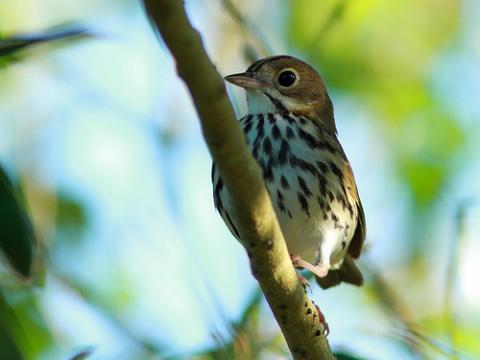Nosey birds, giggling rats, picky fish and helpful bats

With recent research showing that some birds ‘eavesdrop’ on other species in order to protect their young, John Holden looks at other ‘human-like’ traits we share with animals.
It’s very easy to forget - particularly if you’re a city dweller - that human beings are animals like any other. We don’t always use our brains, often act purely on instinct and can be extremely territorial. Those are just three areas where human activity mirrors what goes on in the animal kingdom. However, many of the traits considered ‘strictly human’ can be found out in the wild too. “Anything you can think of that humans show as a group can be found in the animal kingdom,” explains Trinity College zoologist Dr Nicola Marples.
When New York-based scientists discovered that ground-nesting oven birds and veeries ‘eavesdrop’ on chipmunks to protect their nests, the study showed for the first time that birds pay attention to the communication of non-avian species.
Dr Nicola Marples specialises in bird behaviour and has found that many avian species can be characterised in another very human-like way: as picky eaters. “We call them dietary conservatives,” she says. “When encountering a new food the picky bird will say to itself, ‘everything around me could be poison so I’m not going to try it’.” On the flipside you have adventurous consumers. “They say, ‘everything around me might be food so let’s try it all.’ Both categories are present in every population we’ve looked at and both sorts do very well in terms of survival rates. You can go through life either being an adventurous or a picky eater with neither being more beneficial from an evolutionary perspective, much like humans.”
Tests of this nature have been carried out on birds, insects, fish and reptiles but scientists have yet to look at mammals. “Fish and reptiles are exactly the same as birds - all species have a mixture of conservative and adventurous eaters. However, all the insects had the same policy of being moderately adventurous. So that possibly suggests picky individuals only exist in vertebrates.”
For a long time laughing was considered a trait restricted to humans. Then scientists found that rats giggle too. “If you tickle them or when they’re playing, they make the same noise that you’d expect from laughing,” says Marples. “Monkeys do a very wide open mouthed-teeth bearing, which looks aggressive, but actually they do it when they’re having great fun.”
Playing is a trait shared by most young creatures and its developmental significance is growing all the time. “We think of it as a human trait to play gently,” says Marples. “But a lot of animals will self-handicap, or play at the level of skill and strength of the little one being played with.”
In fact there is a whole body of work that says play is the beginning of moral development too. “If a little animal wants to play, if they play roughly with others then no one will play with them the next time,” says Marples. “So they have to learn to play by the rules.” There are rules to play that even simple animals use. “Cats have a play signal, which means ‘I’m going to play with you now,’” she says. “They’ll give the signal initially, and then they’ll play and the other one knows that they’re playing. Whenever they do anything dangerous, like bite the neck, they’ll give the play signal again. There’s an honesty there that they have to stick to certain rules. If they break the rules then next time they won’t be played with and so will lose out on the developmental advantages of being played with.”
Pure altruism is another trait which is rare in the animal kingdom, but common in humans. In fact, one of the most altruistic species is, of all things, the vampire bat. “Altruism is a really interesting one,” says Marples. “In terms of kin selection it makes sense purely as an investment for the future. You want to make more copies of your genes. That’s what breeding is all about. It makes sense to give up your own life to save a nest of your babies.”
But there is also altruism at a higher level - what’s known as reciprocal altruism - seen in vampire bats. “They go out every night to find blood,” she says. “If they don’t find any they will call into their nearby neighbours – whom they will know by name - and ask for some of their food.” If the blood-rich bat knows that this hungry bat has reciprocated in the past, he will regurgitate some if his food for them. If, on the other hand, the bat has a reputation for being a bit of a scrounger, then his neighbour will probably shut the door. “We see this among dog packs and monkey troops also,” says Marples.
Image top: kenschneiderusa.
